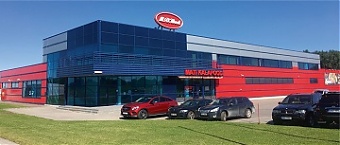Baltic Export, Estonia, Foodstuff, Legislation, Markets and Companies, Retail
International Internet Magazine. Baltic States news & analytics
Thursday, 25.04.2024, 11:19
Estonia: All of the over 600 samples taken in M.V.Wool comply with standards, the adverse effects of the products on human health have been ruled out
 Print version
Print version |
|---|
“Since March 2019, M.V.Wool has been Estonia's most-controlled company in the food industry, and all outbound production is under VFB control. Since April 1st 2019, M.V.Wool has taken more than 600 samples (known as endurance tests) to quantify listeria (Listeria moncytegenese) throughout the product assortment on the last day of the shelf life of their products. As of today, all samples have met the EU limit values with a large margin. Through this, we have proven that the products are safe to consume until the “use by” date, in the case that the storage conditions imposed by the manufacturer have been complied with,” said Mati Vetevool, the Managing Director of M.V.Wool.
“The maximum level of listeria bacteria allowed in the EU is 100 units (Lm (cfu/g)). The report published in June by the European Food Safety Authority (EFSA) confirms that, in samples taken since last year on M.V.Wool premises, the figure remained below 10 units and, in a couple of cases, reached 40 units. The figures that exceeded the limit values were found in the French retail trade company (400 units) and in the Danish wholesale trade company (more than 570 units). In both cases, M.V.Wool has documentational proof that the storage temperature of the goods in question had been breached and that the problem had arose in a later cold chain“, Vetevool said.
The VFB has brought to the attention of the competent authorities of France and Denmark that the storage temperature requirements have been breached in trade there.
M.V.Wool sends non-compliant raw fish back to fish farmers
M.V.Wool conducts random checks to detect the presence of bacteria in raw fish using officially accredited food laboratories. For example, on September 16th the company informed the VFB that it had returned nearly five tonnes of non-compliant raw materials to one Finnish fish farm and that it had blacklisted the fish farmer.
“This was not the first time that the raw fish delivered did not meet the requirements and therefore the conformity to the norms production of Finnish and Norwegian fish farms needs to be thoroughly investigated, as the ineligible raw material can reach consumers through various fish processors,” Vetevool said.
The quality of M.V.Wool is confirmed by certificates and independent audits, and the company is constantly working to ensure that production sold locally and abroad is safe for consumers.
Vetevool noted that, in addition to ensuring quality on the production side, fish products are delivered to dealers in special refrigerated cars to ensure the correct storage temperature of the products, either between 0 and 4 degrees, or deep-frozen to -18 degrees, according to the product. “However, we will not be able to control further down the sales chain and we will only be able to control the reseller's warehouse”.
M.V.Wool deals with the processing, packaging and sale of fishery products. M.V.Wool is currently selling fish products to seven foreign countries. The company has invested a total of 2.5 mln euros in the modernisation of production over the last five years. The manufacturing facility located in Harku holds an IFS Food certificate, the highest certification for the food industry.








 «The Baltic Course» Is Sold and Stays in Business!
«The Baltic Course» Is Sold and Stays in Business!

